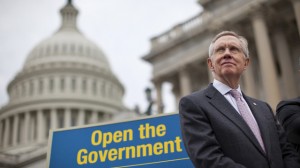
Senate Majority Leader Harry Reid stands on the Senate steps on Capitol Hill in Washington, Wednesday, Oct. 9, 2013. (AP Photo/ Evan Vucci)
It looks like the Republican Party’s overreach has led them to a decisive defeat in this round. The GOP is at war with itself, as it plumbs new depths of public disapproval. The tea partiers are on suicide watch, believing they’ve been stabbed in the back yet again by their squishy leadership.
But this was the latest in a string of battles in which the American economy was ultimately the loser. According to a study released this week by the Peter G. Peterson Foundation, a conservative economic think tank, “crisis-driven government and the resulting fiscal policy uncertainty has directly harmed the American economy by increasing the unemployment rate by 0.6 percent, or the equivalent of 900,000 jobs.” The shutdown itself will shave a third of a point off of economic growth this quarter, concluded the study’s authors.
And the ideological struggle over the need for a functional, sufficiently funded government continues. It’s a conflict conservatives have so far won, especially with the deep cuts of the automatic sequester – the poison fruit of the 2011 debt ceiling stand-off. This week, Rep. Jim Jordan (R-OH) told Fox News that it “has been one of the good things that has happened…in this town,” and vowed, “We’re not going to break the sequester cap.”
But this is where anti-tax ideology runs headlong into reality. Just as their shutdown came with a steep cost, so too has their victory on spending been a painful one for Main Street. According to the Peterson study, deep cuts to discretionary spending have cost the economy 1.2 million jobs since 2010. The Congressional Budget Office estimates that if the sequester continues through next year, it will have cost us 1.6 million jobs.
But in Washington, real leverage will soon to shift toward the Democrats in a big way. The reason Senate Majority Leader Harry Reid (D-NV) was willing to accept a budget through Jan. 15 is because that’s the date the next round of sequester cuts are scheduled to kick in. And if they do, they’ll fall entirely on the defense budget, leaving non-defense spending untouched.
But that’s not the whole story. Frank Kendall, the undersecretary of defense for acquisition, technology and logistics, told The Washington Post that the DoD’s operational budgets have already been slashed to the bone, and neither the Pentagon nor Congress wants to cut military pay, so most of those defense cuts – $20 billion worth – would come out of the hides of military contractors. Kendall warned that it could lead to big layoffs in the industry.
Senate and House conferees will enter into negotiations with the hope of coming up with a budget to replace the sequester by mid-December. Democrats go in having beaten back an attempted debt ceiling coup, with the polls on their side and with the next round of cuts sparing non-defense spending. If they play it right, they could restore some rationality to the budget – undoing cuts to programs like Head Start and possibly gaining some new revenues and investments in infrastructure or other priorities. Economist Jared Bernstein hopes that a budget deal will also be “backloaded in such a way as to spare what’s still a too-fragile recovery from more fiscal headwinds.”
The danger is that Republicans will try to pump up the military budget at the expense of other discretionary spending, and the defense industry has powerful friends in both parties.
There’s also an outside chance that a “grand bargain” might emerge from the budget talks – one that would pair cuts to Social Security and/or Medicare with new tax revenues on high earners and corporations. But the underlying dynamics that have prevented such a deal from being struck so far remain in place: Democrats won’t consider the cuts without significant new revenues and Republicans see those revenues as something slightly worse than an infection of brain-eating amoeba. The only real constituents for this kind of deal are editorial page writers.
With the next debt ceiling pushed back into Spring — close enough to the 2014 midterms to matter — what all of this means is that we may be turning a corner in a three-year period of crisis governance.
Let’s hope so, because the fact remains that ideologically informed austerity policies remain a huge drag on this anemic “recovery,” and we’re not going to get back to full employment anytime soon if we don’t restore some of the spending that’s been cut as a result of the hostage-taking crises we’ve faced since 2010.


